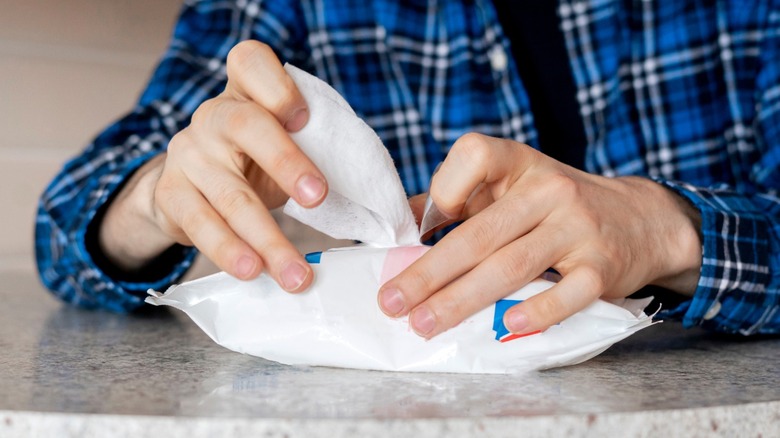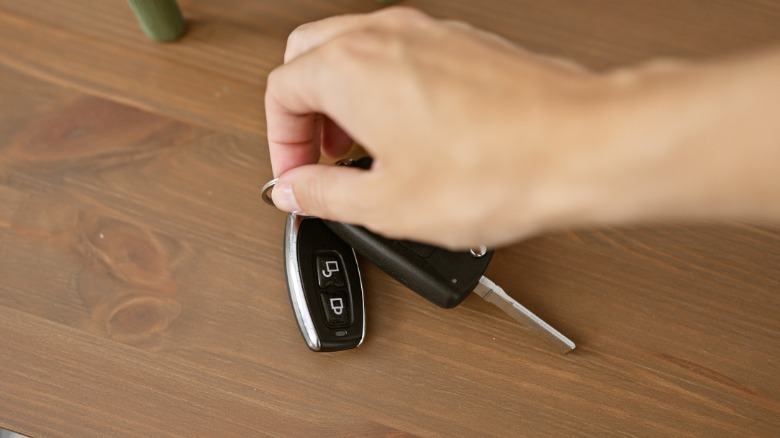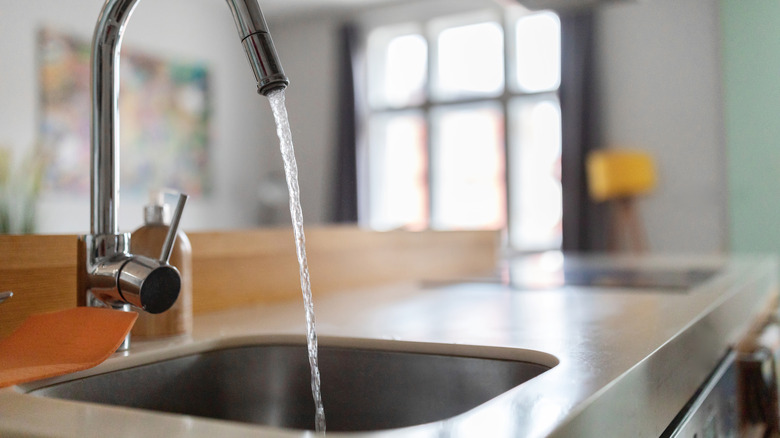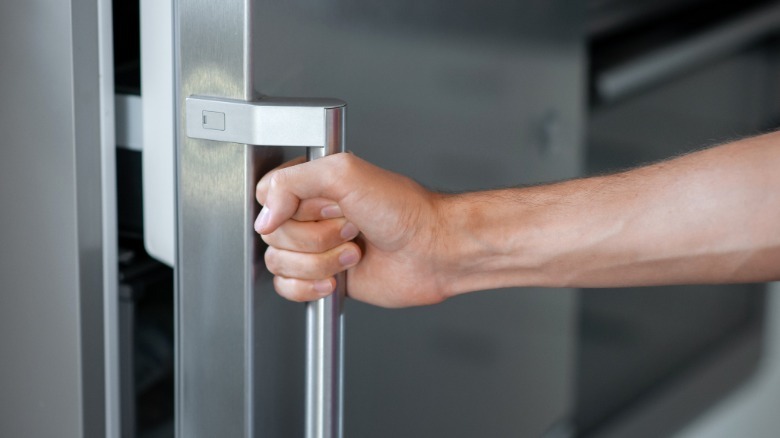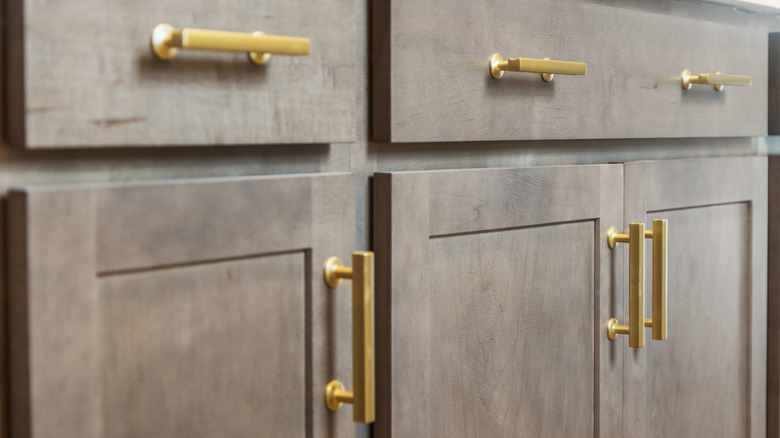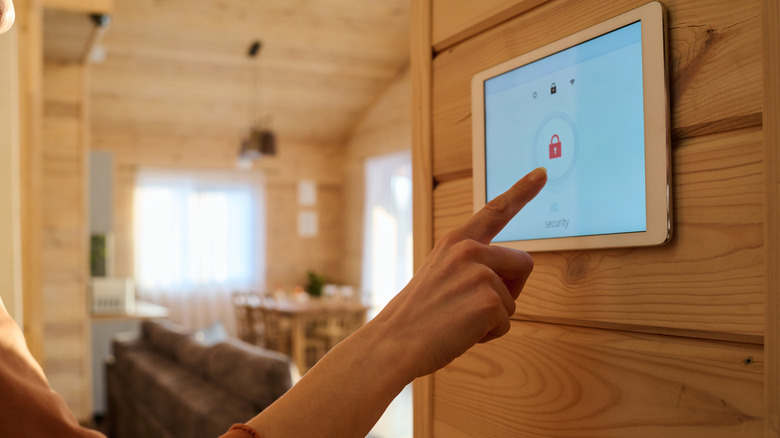13 High Traffic Items You Should Clean With Disinfectant Wipes Right Now
Our hands tend to get pretty dirty during the day and probably way more than you might think. They carry up to 10 million bacteria, and some of those germs can survive for three hours or even longer, per UofL Health. Bacteria and viruses also tend to live longer on nonporous surfaces, like metal or plastic, than on porous ones. Many illnesses spread simply from touch, so it's no wonder health agencies emphasize the importance of handwashing regularly and thoroughly. But it's not just our hands that need frequent cleaning — it's also the high-traffic items we touch every day.
Unless you're committed to keeping your hands completely sterile 24/7, germs will inevitably transfer to and hang out on items like our cell phones, TV remotes, and commonly used fixtures, including light switches and door knobs. Once there, they just have to wait for their chance to be picked up by the person who comes into contact with the surface next. Because germs can survive for over 24 hours in many cases, you should clean these items daily to keep your household healthy and safe.
Phones
Office phones, landlines (if you're one of the few who still has one), and cell phones should all be wiped down thoroughly with disinfectant wipes every day. Cell phones, in particular, can pose a serious health hazard since we handle them constantly throughout the day, often after our hands have come into contact with various bacteria and potentially harmful germs. Before cleaning, make sure your device is unplugged, and be cautious when using wipes that contain bleach or alcohol, as these may wear down the coating on your phone's screen.
Tablets
Tablets are touched almost as often as cell phones, especially if you're an avid user. You might use yours to unwind, while your kids utilize it for the learning apps. All that screen time and hand-touching allows for thousands of germs (some from a potential sneeze or cough) to transfer from the surface to your hands and vice versa. Consider this: You use the tablet, and then your child does, and then you do again. If no handwashing or wipedown happens in between, you've both just shared thousands of germs. So, wipe it down with disinfecting wipes regularly.
Keyboards
Most of us are required to work on a computer, whether it's for work, school, or both, and the same goes for kids. Much of the germs that collect on our hands end up right on the keys we tap every day. According to a study from the University of Arizona (via the National Center for Health Research), the typical desktop contains 400 times more bacteria than the average toilet seat. It's a pretty shocking statistic, and while frequently shared equipment tends to carry more germs, you should nevertheless feel encouraged to wipe down your personal keyboard daily.
Light switches
Light switches are among the most frequently touched surfaces in the house but also likely a part of your home you're not cleaning enough. Just think about how often you flip them on and off in your living room, bedroom, dining area, or even the bathroom. Each time you do, you could be depositing microbes without even realizing it, including germs that cause illness — everything from E. coli to the flu. Make sure you clean your light switches regularly, especially if someone in your family is sick.
Door knobs
Your hands probably come into contact with door knobs when they're at their dirtiest. Think about it: After getting home from work, running errands, or spending the day out with friends, your hands are likely carrying germs picked up along the way. And while you may wash them once you're inside, you've already touched the outside and inside door knobs and maybe the one leading to your bathroom sink. Basically, the germs have already made their way around your home, so it's wise to give these high-traffic spots a thorough wipedown often, especially if you've had guests.
Remote controls
You probably don't realize it, but that remote control sitting on your TV stand is one of the highest-traffic (and therefore dirtiest) items in your home. You, your partner, and your kids have likely touched it at least once during the day. And who's to say their hands were clean when they did? According to an analysis from Churchill Home Insurance (via Direct Line Insurance Group), remote controls have 15 times more Enterobacter (a type of bacteria found in feces) than the average toilet seat, reminding us just how filthy these little gadgets can get.
Keys
You might be the only one handling your car or house keys, but those bad boys are dirtier than you think, and they definitely deserve a good wipedown with a disinfectant wipe. According to a study conducted by Money Super Market, car keys contain nearly four times more bacteria than your cell phone or computer keyboard. It makes sense when you think about it, because half the time you're grabbing them, your hands haven't been washed. Chances are, they've fallen on the ground a few times, too.
Toilet handles
The toilet handle is another frequently touched item that often gets overlooked when disinfecting. Since most people flush the toilet right after using it rather than after washing their hands, they could be spreading salmonella, E. coli, or norovirus, a few common germs that can linger on our hands after using the restroom. This not only puts you at risk of touching those germs later but also exposes others in your household who might wash their hands and then flush. Either way, that small handle could be harboring a whole lot of bacteria, so it's worth disinfecting.
Sink faucets
Adjacent to toilet handles, sink faucets also create the perfect environment for germs to thrive. In fact, UofL Health mentioned that frequently touched faucet handles can harbor roughly 229,000 germs per square inch (about the size of a postage stamp)! While UofL Health also noted that kitchen faucet handles are worse than bathrooms, really any tap handle that is touched often will collect bacteria, so wipe them down with disinfectant wipes on a daily basis.
Appliances
There are likely several home appliances you're forgetting to clean on the regular, allowing everything from your microwave and toaster to your fridge handles and air fryer to become covered in not only potentially dangerous bacteria but also oils and grime. And that's because you touch them every day, as do other members of your household. The same goes for your washing machine and dryer lids, coffee maker, and even stove knobs. All of these commonly touched surfaces deserve a good disinfecting wipedown daily, especially if you're hosting or giving your appliances lots of use.
Cabinet handles
You (and others in your household) probably reach for your kitchen and bathroom cabinet handles several times a day, whether it's to grab a towel or reach under the sink for a fresh roll of toilet paper. And let's be honest, your hands aren't always the cleanest when you do. Actually, it's a known fact they aren't. According to a U.S. Department of Agriculture (USDA) study, 97% of consumers don't wash their hands properly. Whatever's on your hands can easily transfer to those handles, potentially making them one of the germiest spots in your home.
Desk surfaces
Desks used for remote work or as study zones for kids come into contact with all kinds of items, including computers, books, binders, and pencils, each carrying their own load of germs. Every time you touch these, you transfer those germs right onto your desk. Since this area also often doubles as a spot to grab a quick meal and scroll your phone or where your child can munch on a snack, it's definitely considered a high-traffic zone. And that means it's another surface that needs a good cleaning with disinfectant wipes as soon as possible.
Alarm panels
Alarms give you peace of mind knowing your home is secure. But the panels you use to turn them on and off or to check who rang your doorbell get touched often, and you probably don't always wash your hands before doing it. That means you're transferring germs straight onto the panel, where they sit and wait for the next hand to come along to contaminate. When you think about all the things you do between setting and disarming your alarm, it's a little scary to imagine what's lurking on that panel.
